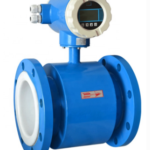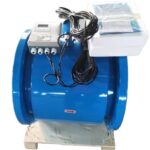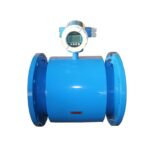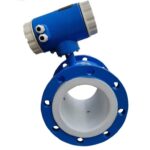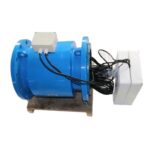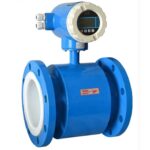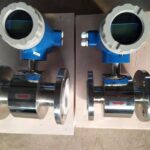Electromagnetic Digital Flow Meter
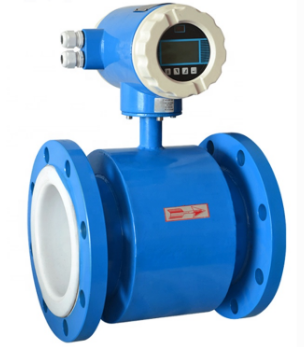
Electromagnetic Digital Flow Meter
2. Type: split type, integrated type, plug-in type (suitable for pipe diameters above DN100)
3. Lining material: Neoprene, PTFE, PFA, FEP, F46
4. Electrode material: SS316L, HC, HB, Ti, Tan, Pt
1. working principle:
An electromagnetic digital flow meter is a device used to measure the flow of liquid in a pipeline. A coil of wire surrounding the inner conduit creates a magnetic field, and as the conductive liquid passes through the magnetic field, it induces a voltage proportional to its speed, which is measured by a pair of electrodes on either side of the field. The signal is then transmitted to a converter, and electronic circuits within the flow converter convert the induced voltage into flow and display it on the LCD screen.
The advantages of this equipment are: high precision, stability and reliability, no internal damping parts, wide application range, and easy installation and maintenance. Can be used to measure the flow of a variety of conductive liquids, including corrosive and abrasive liquids, liquids containing solids or bubbles. Especially for the measurement of domestic sewage, industrial sewage, pulp, slurry and wastewater treatment, electromagnetic flowmeter should be the first choice.
|
|
|
|
2. Application scenarios and scope of application:
The electromagnetic digital flow meter is a widely used and highly accurate measurement tool that is widely used in various industries. Its ability to measure the flow of conductive liquids makes it an important tool in industries such as manufacturing, water treatment, oil, gas, chemicals, food and beverage, and more.
⑴ Water supply industry, measurement and control of water flow in pipelines. Water supplies use them to monitor water flow in homes and industries. The technology makes it possible to accurately detect and identify pipe leaks, thereby promoting water conservation. This instrument is also the first choice among flow measurement equipment for farmland irrigation.
⑵ Chemical industry, used to monitor the flow and usage of different chemicals to ensure accurate amounts used in the production process. It plays an important role in the oil and gas industry.
⑶ Food and beverage industry, magnetic flow meters are used to monitor and regulate the flow of various liquids such as milk, beer and soda during the production process to ensure consistent quality and quantity. This plays a vital role for optimal production and reduction of waste.
⑷ Used in the pharmaceutical industry, its high accuracy and sensitivity enable it to effectively monitor liquid flow in pipelines and storage tanks.
⑸ Sewage and wastewater treatment. This equipment is the preferred instrument for sewage and wastewater treatment. It can measure fluids containing a large number of impurities in the liquid, and can also measure corrosive liquids such as strong acids and alkalis.
3.Selection of lining material:
The lining material is one of the key components of the flow meter, and its selection is based on various factors such as chemical compatibility of the measured medium, temperature and wear resistance.
| Lining material | Lining material properties |
| Rubber lining | It is made of natural or synthetic rubber and has excellent resistance to a variety of lightly corrosive and abrasive liquids. It is also flexible and can withstand high pressure and temperature. |
| PTFE lining | PTFE lining is the most widely used option. Made of polytetrafluoroethylene, this lining material offers excellent chemical resistance, especially in highly corrosive and acidic environments. It also has excellent high temperature and pressure resistance. |
| Ceramic lining | Ceramic lining is suitable for measuring extremely abrasive fluids. It is made of high-density alumina ceramic, which has excellent wear resistance, corrosion resistance and high temperature resistance. However, it is not recommended for handling corrosive liquids as it can easily break. |
| ETFE lining | ETFE lining is a thermoplastic fluoropolymer used for liquid measurement that handles corrosive chemicals such as hydrofluoric acid and chlorine. It has excellent chemical resistance, high temperature resistance and low permeability to liquids and gases. |
| Polyurethane lining | Polyurethane lining is a highly wear-resistant lining material used for handling slurries, measurements of liquids containing solid impurities and other abrasive fluids. It is made by pouring a layer of polyurethane onto a base material and offers excellent wear, impact and tear resistance. |
4.Electrode material selection:
Electrode materials are an important part of the flow measurement equipment. Each electrode has its own unique characteristics. Liquids with different properties require different types of electrodes, which can improve the accuracy and durability of the equipment.
| Electrode material type | Electrode material properties |
| 316L stainless steel electrode (SS316) | 316L stainless steel electrodes are not corrosion resistant. Very durable, requires minimal maintenance and is low cost, making it a popular choice in many industries. |
| Titanium electrode | It is known for its excellent corrosion resistance and is often used in applications where the fluid being measured is highly corrosive. Titanium electrodes are lightweight and have a high strength-to-weight ratio, making them ideal for applications. |
Hastelloy(HB) | It is resistant to all concentrations of hydrochloric acid below the boiling point, and is also resistant to corrosion by non-oxidizing acids, alkalis and non-oxidizing salt solutions such as sulfuric acid, phosphoric acid and hydrofluoric acid. |
Hastelloy (HC) | It is resistant to corrosion by oxidizing acids, such as nitric acid, mixed acids or mixed media of chromic acid and sulfuric acid, and is also resistant to corrosion by oxidizing salts or other oxidants. |
Stainless Steel Coated Tungsten Carbide | For non-corrosive, highly abrasive media. |
Tantalum (Ta) | Excellent corrosion resistance. Except for hydrofluoric acid, fuming sulfuric acid and alkali, it is resistant to corrosion by almost all chemical media, but is not resistant to corrosion in alkali. |
Platinum-iridium alloy | Used for all chemical substances, resistant to corrosion (such as acid, alkali, various salts), but not resistant to aqua regia. |
5.Production workshop and calibration equipment:
We have a large inventory of semi-finished products and can complete production quickly. All our products are guaranteed to undergo one-to-one 5-point calibration before leaving the factory to ensure that the factory accuracy reaches international standards. And the factory qualification rate is 100%.
|
|
|
|
6.Verification video:
7.FAQ:
1. Q: Are you a manufacturer? Which city is the factory located in?
A: Yes, we are a manufacturer and our factory address is in Kaifeng City, Henan Province, China.
2. Q: What is the warranty of your products?
A: The warranty for all our products is 24 months. If there are quality problems, we can provide new equipment for free.
3.Q: What is your MOQ PCS?
A: Our minimum order quantity is 1PCS.
4. Q: What shipping methods do you support?
A: We support: Express door to door, By air, By sea, By railway. If you have your own freight forwarder, we can transport the goods to your designated shipping address in China for free.
